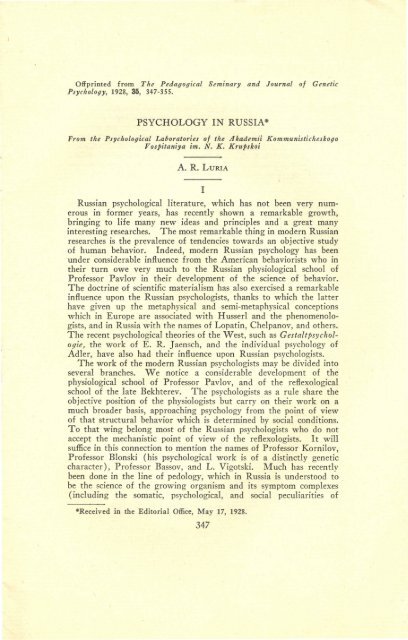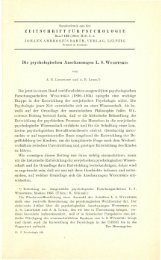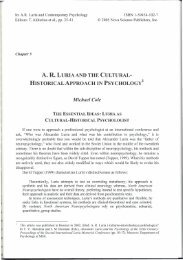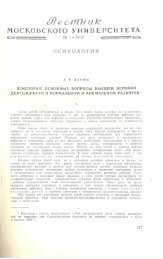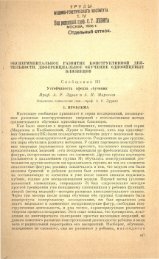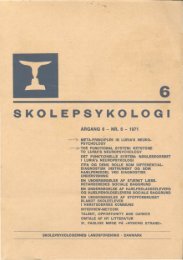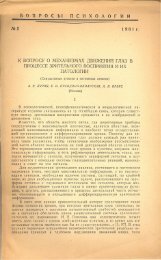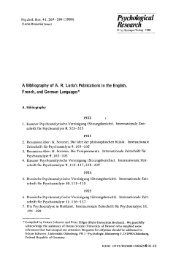Psychology in Russia - Luria, Alexander R.
Psychology in Russia - Luria, Alexander R.
Psychology in Russia - Luria, Alexander R.
Create successful ePaper yourself
Turn your PDF publications into a flip-book with our unique Google optimized e-Paper software.
Offpr<strong>in</strong>ted from The Pedagogical Sem<strong>in</strong>ary and Journal of Genetic<br />
<strong>Psychology</strong>, 1928, 35, 347-355.<br />
PSYCHOLOGY<br />
IN RUSSIA*<br />
From the Psychological Laboratories of the Aka,demii Kommunisticheskogo<br />
Fo spitaniya im. N. K. Krupskoi<br />
A. R. LURIA<br />
I<br />
<strong>Russia</strong>n psychological literature, which has not been very numerous<br />
<strong>in</strong> former years, has recently shown a remarkable growth,<br />
br<strong>in</strong>g<strong>in</strong>g to life many new ideas and pr<strong>in</strong>ciples and a great many<br />
<strong>in</strong>terest<strong>in</strong>g researches. The most remarkable th<strong>in</strong>g <strong>in</strong> modern <strong>Russia</strong>n<br />
researches is the prevalence of tendencies towards an objective study<br />
of human behavior. Indeed, modern <strong>Russia</strong>n psychology has been<br />
under considerable <strong>in</strong>fluence from the American behaviorists who <strong>in</strong><br />
their turn owe very much to the <strong>Russia</strong>n physiological school of<br />
Professor Pavlov <strong>in</strong> their development of the science of behavior.<br />
The doctr<strong>in</strong>e of scientific materialism has also exercised a remarkable<br />
<strong>in</strong>fluence upon the <strong>Russia</strong>n psychologists, thanks to which the latter<br />
have given up the metaphysical and semi-metaphysical conceptions<br />
which <strong>in</strong> Europe are associated with Husserl and the phenomenologists,<br />
and <strong>in</strong> <strong>Russia</strong> with the names of Lopat<strong>in</strong>, Chelpanov, and others.<br />
The recent psychological theories of the West, such as Gestaltpsycholoaie,<br />
the work of E. R. Jaensch, and the <strong>in</strong>dividual psychology of<br />
Adler, have also had their <strong>in</strong>fluence upon <strong>Russia</strong>n psychologists.<br />
The work of the modern <strong>Russia</strong>n psychologists may be divided <strong>in</strong>to<br />
several branches. We notice a considerable development of the<br />
physiological school of Professor Pavlov, and of the reflexological<br />
school of the late Bekhterev. The psychologists as a rule share the<br />
objective position of the physiologists but carryon their work on a<br />
much broader basis, approach<strong>in</strong>g psychology from the po<strong>in</strong>t of view<br />
of that structural behavior which is determ<strong>in</strong>ed by social conditions.<br />
To that w<strong>in</strong>g belong most of the <strong>Russia</strong>n psychologists who do not<br />
accept the mechanistic po<strong>in</strong>t of view of the reflexologists. It will<br />
suffice <strong>in</strong> this connection to mention the names of Professor Kornilov,<br />
Professor Blonski (his psychological work is of a dist<strong>in</strong>ctly genetic<br />
character), Professor Bassov, and L. Vigotski. Much has recently<br />
been done <strong>in</strong> the l<strong>in</strong>e of pedology, which <strong>in</strong> <strong>Russia</strong> is understood to.<br />
be the science of the grow<strong>in</strong>g organism and its symptom complexes<br />
(<strong>in</strong>clud<strong>in</strong>g the somatic, psychological, and social peculiarities of<br />
·Received <strong>in</strong> the Editorial Office, May 17, 1928.<br />
347


